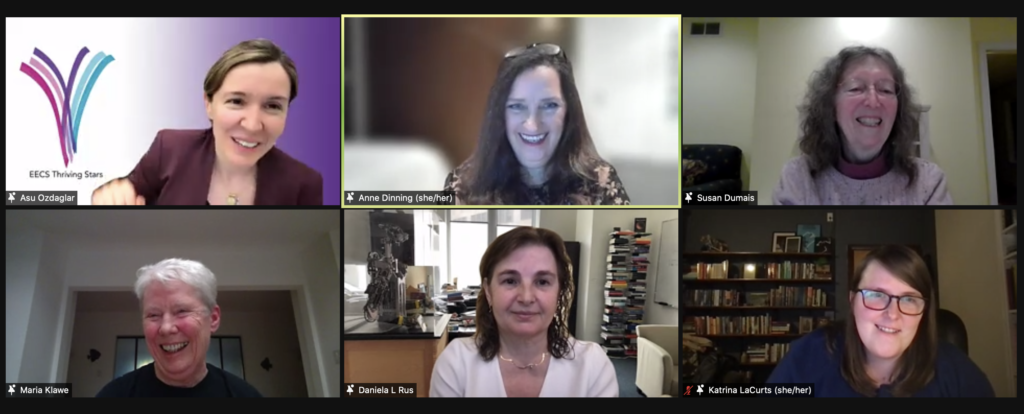
Rachel Yang | Department of Electrical Engineering and Computer Science
On February 3, 2022, EECS Thriving Stars hosted a virtual panel of five highly accomplished women in leadership roles to discuss their career paths from their PhD and onwards. These women shared candid stories and relayed valuable advice to an eager audience. The panelists were: Anne Dinning, managing director of DE Shaw & Co; Susan Dumais, director of the Microsoft Research Labs (New England, New York and Montreal); Maria Klawe, president of Harvey Mudd College; Katrina LaCurts, undergraduate officer and senior lecturer EECS at MIT; and Daniela Rus, professor of EECS and lab director of CSAIL at MIT.
MIT EECS Department Head Asu Ozdaglar moderated the panel, which was specifically geared towards the concerns and questions of women and underrepresented genders who are interested in or currently pursuing a PhD.
The panel covered career-related topics, including the panelists’ motivations for pursuing a PhD, the obstacles they have faced and overcome during their careers, their approaches for balancing work and life priorities, and their experiences as pioneering women in their careers. The panelists reflected on their experiences as graduate students, imparting lessons they learned to the attendees. Rus recalled her PhD years as being “amazing years of freedom, of adventure, of discovery,” encouraging students to “enjoy these times because these are the halcyon days of your growth.” Dumais echoed these sentiments while adding that pursuing a PhD was one of the “most important decisions in [her] career” because she could “use skills like math and science to help people.”
The panelists also shared the difficult experiences they had encountered in graduate school with candor and transparency, acknowledging that while graduate school can be a time of growth, it can also be a time of tremendous isolation. Klawe bravely shared a devastating story where she was abused and isolated as a PhD student, culminating in a period when she had to withdraw from academia for her own protection. Then, instead of stopping at the end of her story, Klawe used the panel’s platform to share an important message: “Although [graduate school] is a time of tremendous opportunity, if for some reason you’re going through difficulty, ask for help.”
LaCurts also shared her difficulties in graduate school as she was finding her career path, gravitating towards the less popular choice of teaching over research. “I felt a disconnect between what I wanted for my life and what other people thought I should do,” she said. But she gained confidence in her decision after hearing a friend’s mother’s reaction to her career plans. “She just looked at me and was like oh my gosh, that’s so wonderful: so many women will see you.”
The panelists then delved deeper into gender representation in their career paths. Klawe encouraged attendees to take on leadership roles. As a woman or underrepresented gender, “you’re opening doors for other people in huge ways” by showing what these genders can achieve, she said. Klawe has been the first woman in many leadership positions throughout her career, including her current position as the president of Harvey Mudd College. Other panelists have also paved the way for better gender representation in their careers. Rus is the first female director of CSAIL, Dinning is the first female managing director at DE Shaw & Co, and Ozdaglar is the first female MIT EECS Department Head. “The panel was the first time I’ve had the experience of seeing a lot of really accomplished women in STEM, engineering, or EECS,” said Elaine Ng, an MIT MEng student who plans to pursue a PhD.
The panelists also discussed leveraging their leadership roles to effect immediate change. At the Microsoft Research Labs, Dumais works “to create a diverse and inclusive environment where people can do their best work.” Dinning stressed the importance of being assertive and standing your ground once you’ve taken on a leadership role. “When people think, ‘Why do I have to listen to her?’ I [respond], ‘well, you have to because I’m the right person in the room,” she said.
The panel was extremely popular, attracting 231 total attendees, with MIT EECS undergraduate and graduate students, as well as newly admitted graduate students, in the audience. Attendees remained heavily engaged in the discussion from beginning to end, eagerly asking questions, even after the event’s official end time. “The event was phenomenal. I got many notes from the students telling me how much they appreciated the event and learned from each of the panelists’ stories,” Ozdaglar said.
Many attendees were extremely appreciative of the panelists’ honesty and found their stories inspiring. Ng felt inspired to “be more involved in the effort of getting more women into [EECS],” realizing that her position as a future doctorate holder will empower her to make a difference in other people’s lives. Another student said, “I feel responsible to be one of the female pioneers in this field.” After attending the panel, this student has decided to attend MIT for graduate school. “I am sincerely glad and excited to start my journey for a PhD in this lovely community,” she said. With one more talented woman pursuing a PhD, “our Thriving Stars goal [to close the gender gap in EECS] is being achieved,” said Leslie Kolodziejski, MIT EECS professor and member of the Thriving Stars Advisory Board.